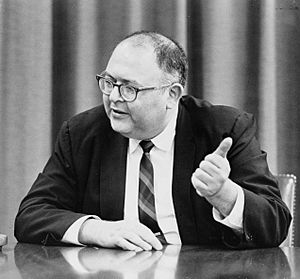Herman Kahn facts for kids
Quick facts for kids
Herman Kahn
|
|
|---|---|

Kahn on May 11, 1965
|
|
| Born | February 15, 1922 Bayonne, New Jersey, U.S.
|
| Died | July 7, 1983 (aged 61) Chappaqua, New York, U.S.
|
| Nationality | American |
| Alma mater | University of California, Los Angeles (BS) California Institute of Technology (MS) |
| Occupation | |
| Known for | Nuclear strategy |
|
Notable work
|
On Thermonuclear War |
Herman Kahn (February 15, 1922 – July 7, 1983) was an American physicist and a very important thinker. He helped start the Hudson Institute, a famous research group. People saw him as one of the top "futurists" of his time. Futurists study and predict what the future might be like.
Kahn first became known for his work at the RAND Corporation. There, he studied military strategy and how different systems work. He was especially known for thinking about nuclear war during the Cold War. He explored what might happen if a nuclear war broke out. He also suggested ways people could survive such an event. His ideas helped shape the nuclear strategy of the United States.
Contents
Early Life and Education
Herman Kahn was born in Bayonne, New Jersey. His parents, Yetta and Abraham Kahn, were immigrants from Eastern Europe. His father worked as a tailor. Herman grew up in the Bronx, New York. Later, after his parents divorced, he moved to Los Angeles.
He finished Fairfax High School in 1940. During World War II, he served in the United States Army. He worked as a telephone lineman during the Burma campaign. After the war, he earned a Bachelor of Science degree from UCLA. He also studied at CalTech. He left CalTech with a Master of Science degree because of money problems. Later, he joined the RAND Corporation as a mathematician.
Thinking About Nuclear War
Kahn's most important work was about "the unthinkable." This meant thinking deeply about nuclear warfare. He used ideas from game theory to explore different scenarios. Game theory is a way to understand how people or groups make decisions when their choices affect each other. Kahn is also seen as a founder of "scenario planning." This is a method for imagining different possible futures.
He believed that if the Soviet Union knew the United States could strike back after an attack, it would stop them from attacking first. This idea is called "deterrence." He wrote about this in his paper, "The Nature and Feasibility of War and Deterrence."
The Escalation Ladder
In 1962, Kahn created a model called the "escalation ladder." This ladder showed different steps a conflict could take, from small disagreements to a full-scale nuclear war. By 1965, he had expanded it to 44 steps. This ladder helped people understand how conflicts might grow more serious.
The Hudson Institute
In 1961, Herman Kahn helped create the Hudson Institute. This was a "think tank," which is a group that does research and gives advice. It was first located in Croton-on-Hudson, New York. Kahn brought in other smart people to work there. These included sociologist Daniel Bell and novelist Ralph Ellison.
Predicting the Future
In 1967, Herman Kahn and Anthony J. Wiener wrote a book called The Year 2000. This book looked at what the world might be like in the next 33 years. It included many predictions from the Hudson Institute staff.
The book listed "One Hundred Technical Innovations Very Likely in the Last Third of the Twentieth Century." Some of these predictions included:
- Many uses for lasers.
- Very strong new building materials.
- Better fabrics for clothes and equipment.
- New types of flying vehicles, like giant jets.
- New ways to get power for homes and cars.
Later Years and Optimism
Herman Kahn believed that capitalism and technology had huge potential for good. He thought that humans could make great progress. He even believed that colonizing space was not far off.
In his 1976 book, The Next 200 Years, Kahn shared a hopeful view. He imagined a very positive future for the economy in the year 2176. He also wrote books about the future economies of America, Japan, and Australia.
Kahn made a bold prediction about South Korea. In the mid-1970s, South Korea was a poor country. But Kahn predicted it would become one of the top 10 most powerful countries by the year 2000. This prediction turned out to be true.
In 1983, his last year, Kahn wrote The Coming Boom. In this book, he supported the ideas of President Ronald Reagan. Herman Kahn died of a stroke on July 7, 1983, when he was 61 years old.
Personal Life
Herman Kahn was the son of Abraham and Yetta Kahn. He was married to Rosalie "Jane" Kahn. They had two children together, named David and Debbie.
Cultural Impact
Herman Kahn is said to have inspired the character "Dr. Strangelove" in the famous 1964 movie of the same name. The movie was directed by Stanley Kubrick. Kubrick read Kahn's book On Thermonuclear War. This led to discussions between them.
In the movie, Dr. Strangelove talks about a "Doomsday Machine." This machine would destroy the whole planet if a nuclear attack happened. The idea for this machine came from Kahn's book On Thermonuclear War.
See also
- Nuclear triad
 In Spanish: Herman Kahn para niños
In Spanish: Herman Kahn para niños
 | Georgia Louise Harris Brown |
 | Julian Abele |
 | Norma Merrick Sklarek |
 | William Sidney Pittman |

